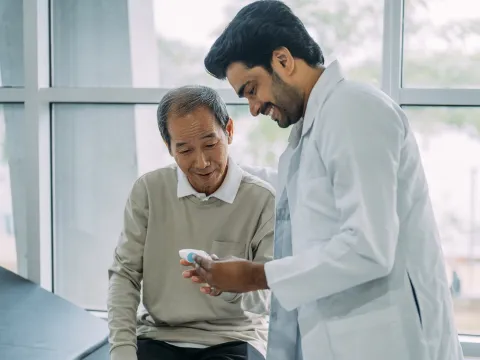- AdventHealth

Choose the health content that’s right for you, and get it delivered right in your inbox.
Weighing in between 3 and 5 pounds, your liver is your largest internal organ. And next to the brain, it has the most functions — responsible for more than 500 different jobs, many related to metabolism. But because the liver can fly under the radar — not making itself known unless something is wrong. The importance of liver health isn’t always well understood.
The Role of the Liver
Your liver filters your blood, a lot of it. It also plays a major role in your metabolism, converting nutrients into energy and breaking down harmful substances so they can leave the body as waste.
Your liver performs other jobs too, including:
- Aiding in blood clotting
- Converting unused glucose, or blood sugar, into glycogen, a form of glucose that can be stored
- Producing proteins, cholesterol and bile, an acidic liquid that helps carry away waste and breaks down fats during digestion
- Regulating levels of amino acids, which form the building blocks of proteins
- Storing iron
Genetic conditions and other factors, like viruses, alcohol use and obesity, can damage your liver. And over time, that can cause scarring, or cirrhosis. Cirrhosis can lead to liver failure, a life-threatening condition. It can also prevent your liver from performing its critical functions, including helping to eliminate harmful toxins from the body. So can nonalcoholic fatty liver disease (NAFLD), which is linked to being overweight or obese and is one of the fastest-growing forms of liver disease.
Other common forms of liver disease include alcohol-related liver disease, which is associated with chronic or long-lasting alcohol use, and chronic hepatitis infection, which is caused by the hepatitis B or hepatitis C virus.
How to Take Care of Your Liver
Although there are some risk factors for liver disease you can’t control, there are many you can influence through lifestyle and behavioral choices.
- Exercise and Eat a Healthy Diet
Regular exercise helps your body burn fuel and reduce liver fat. And eating a diet that’s high in fiber and low in fat, sugar and salt can help keep the liver functioning well. Some of the best foods for your liver include fresh fruits, vegetables, whole-grain breads and rice. You should also drink plenty of water. - Maintain a Healthy Weight
By keeping your weight at a healthy level, you’re lowering your risk of developing NAFLD. Similarly, if you’re overweight or obese and take steps to lose weight, you can help reduce fatty liver tissue and your risk of the disease. - Limit Alcohol Consumption
Excess alcohol can damage or destroy liver cells — not to mention scar your liver. It can also prevent your liver cells from performing their normal functions. - Avoid Toxins
Chemicals found in products like cleaners and pesticides can injure liver cells. Read warning labels on any chemical-containing products you use. - Get Vaccinated
Hepatitis A, hepatitis B and hepatitis C are all viruses that impact the liver. Although there isn’t a vaccine for the hepatitis C virus, there are vaccines available for hepatitis A and hepatitis B.
In addition to getting vaccines to protect yourself, you can reduce the transmission of viruses through the blood or other bodily fluids — or through contact with contaminated food or water — by practicing safe sex and washing your hands often.
Liver Care You Can Count On
Whether your liver stops performing optimally or you show signs of liver damage, you need immediate care. And you can count on our knowledgeable and caring experts to guide you with a personalized care plan every step of the way.
Learn how our hepatology program can help.



